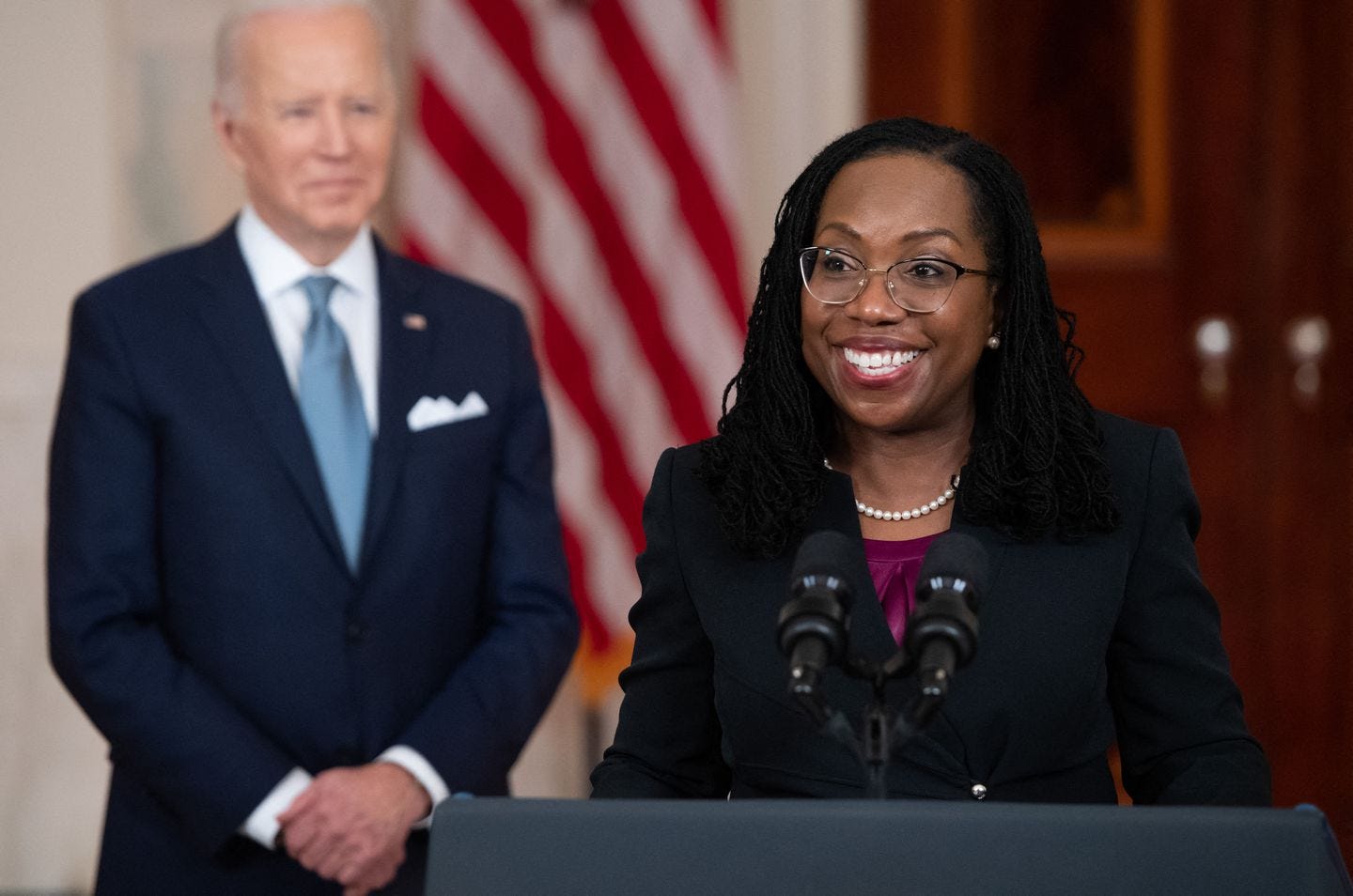The Liberal Patriotism of Judge Ketanji Brown Jackson
Faith, family, love of country, public service, personal decency, fairness and impartiality are basic American values everyone can respect.

People are so jaded about politics these days that it’s easy to overlook the good qualities and characteristics of our fellow citizens who are thrust into important decision making positions that affect us all. President Biden’s nomination of D.C. federal court of appeals Judge Kentanji Brown Jackson to the Supreme Court on Friday, amidst an unfolding Russian war against Ukraine, is one such moment.
There will be plenty of wrangling over Judge Jackson’s past rulings and constitutional philosophy, and scores of legal analysis about upcoming ideological battles on the Court. A confirmation process is not a walk in the park, and as with all nominees, her views and past arguments should be thoroughly evaluated by the U.S. Senate and the American public.
But her brief and sincere self-introduction to the country was a reminder of America’s great story and the principles and beliefs that underpin our nation’s success. Judge Jackson grounded her life in three primary values: faith, love of country, and family:
I must begin these very brief remarks by thanking God for delivering me to this point in my professional journey. My life has been blessed beyond measure, and I do know that one can only come this far by faith.
Among my many blessings – and indeed, the very first – is the fact that I was born in this great country. The United States of America is the greatest beacon of hope and democracy the world has ever known.
I was also blessed from my early days to have had a supportive and loving family. My mother and father, who have been married for 54 years, are at their home in Florida right now, and I know that they could not be more proud.
It was my father who started me on this path. When I was a child, as the President mentioned, my father made the fateful decision to transition from his job as a public high school history teacher and go to law school. Some of my earliest memories are of him sitting at the kitchen table, reading his law books. I watched him study and he became my first professional role model.
My mother, who was also a public high school teacher, provided invaluable support in those early days, working full-time to enable my father’s career transition while also guiding and inspiring four-year-old me.
My only sibling – my brother, Ketajh – came along half a decade later, and I am so proud of all that he’s accomplished. After graduating from Howard University, he became a police officer and a detective on some of the toughest streets in the inner city of Baltimore. After that, he enlisted in the Army, serving two tours of duty in the Middle East. I believe that he was following the example set by my uncles who are in law enforcement
You may have read that I have one uncle who got caught up in the drug trade and received a life sentence. That is true, but law enforcement also runs in my family. In addition to my brother, I had two uncles who served as police officers, one of whom became the police chief in my hometown of Miami, Florida.
I am standing here today by the grace of God as testament to the love and support that I’ve received from my family.
Judge Jackson goes on to thank her own husband and daughters and to describe her professional mentors, including the retiring Associate Justice Stephen Breyer whose seat she will likely fill. Among the lessons she took away from this relationship with Justice Breyer is that one “can perform at the highest level of skill and integrity while also being guided by civility, grace, pragmatism, and generosity of spirit.”
The parallels with Justice Amy Coney Barrett are interesting here. Although she comes out of the conservative side of the legal world, and will probably be on the opposite side of Jackson on many future rulings, Justice Barrett also grounds her legal career and worldview in faith, family, country, and strong role models. This is not mere pablum to get through the nomination process. Both women are testaments to the core values of the United States and both can serve as inspirations for people across the spectrum who may not agree with either of them ideologically or philosophically.
Notably, Judge Jackson acknowledged the weight of history in her nomination as the first black woman to sit on the Supreme Court. But she said her good fortune and opportunity rests on the shoulders of people before her like federal judge Constance Baker Motley, a civil rights pioneer who worked with Thurgood Marshall and was the first African-American woman appointed to the federal bench. America has had extremely bad periods of discrimination and racism in its past—including for Jackson’s parents who both attended segregated primary schools—and many important periods of progress towards real equality and dignity for all people under the law. Judge Jackson’s life and work represents this full picture of American history.
Jackson concluded her remarks by saying: “And if I am fortunate enough to be confirmed as the next Associate Justice of the Supreme Court of the United States, I can only hope that my life and career, my love of this country and the Constitution, and my commitment to upholding the rule of law and the sacred principles upon which this great nation was founded will inspire future generations of Americans.”
As Americans, we hope so too. Good luck to Judge Jackson and hopefully when she sits on the Court she will rule wisely and remember that the core American values that define her life must always be protected for everyone.


